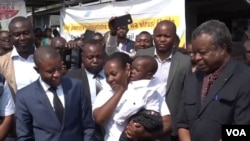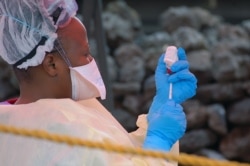This report originated in VOA’s Swahili Service.
After 29 days at an Ebola treatment center in eastern Congo, fighting for their lives, a mother and her young son were discharged Tuesday amid applause and laughter.
“I feel very good and my son also is well,” a smiling Esperance Nabintu told a small crowd gathered outside the treatment center for a short, celebratory news conference. She wiped tears from the cheeks of her 1-year-old son, Ebenezer Fataki, who squirmed and cried.
She wore a white T-shirt that proclaimed, in French, “I am cured of Ebola.”
Both Nabintu and her child have recovered from the virus that killed Nabintu’s husband weeks ago, doctors say.
Theirs are among more than 2,800 confirmed cases of the disease that has claimed nearly 1,900 lives since the outbreak began a year ago in the eastern DRC.
Life-saving treatments
The mother and son’s release follows scientists’ announcement Monday that two experimental Ebola drug therapies have proved so successful they will be made available to all Ebola patients in the DRC outbreak. Both contain antibodies: REGN-EB3 was developed by Regeneron Pharmaceuticals and mAb114 was developed by the U.S. National Institute of Allergy and Infectious Diseases.
It was unclear, as of this writing, which treatment the mother and son received.
The fatality rate for this Ebola outbreak - the second-largest in history behind the 2014-15 West Africa outbreak - is 67 percent, according to the World Health Organization. REGN and mAb114 substantially improve patient survival rates, based on the clinical trials.
"From now on, we will no longer say that EVD (Ebola virus disease) is not curable," Dr. Jean-Jacques Muyembe-Tamfum, who directs the DRC’s National Institute of Biomedical Research, said in a teleconference. "This advance will, in the future, help save thousands of lives that would have had a fatal outcome in the past."
Dr. Richard Mutakukuru echoed that notion in Tuesday’s joyous sendoff for Nabintu and her son.
“Being infected with Ebola is not the end of the world,” he said. “Ebola is just like any other disease – only that it kills very fast. If one feels symptoms related to Ebola infection, we advise that he or she seeks a doctor’s attention.”
The virus, which can cause severe internal bleeding, is transmitted via contact with the bodily fluids of an infected person.
Mutakukuru said that anyone diagnosed with Ebola would be treated and then would “leave after a few days, completely healed.”
A survivor’s message
The DRC government has appointed Nabintu to be a goodwill ambassador to help battle another component of the Ebola epidemic: rampant mistrust.
While the country has experienced nine other outbreaks since Ebola’s discovery in 1976, the disease previously was unfamiliar in the northeast, a region already destabilized by at least two decades of conflict. People there have been skeptical of the federal government’s intentions and those of Western aid groups that operate or help staff treatment centers.
Residents have seen people enter treatment facilities and leave in body bags – making them wary of seeking formal treatment when symptoms emerge.
Nabintu – who was treated at a DRC facility operated by the WHO and the medical aid group Doctors Without Borders – wants to change that negative mindset.
“My message to everyone is that Ebola is real,” she said. “People should seek a doctor’s attention as quickly as possible when they feel unwell.”













